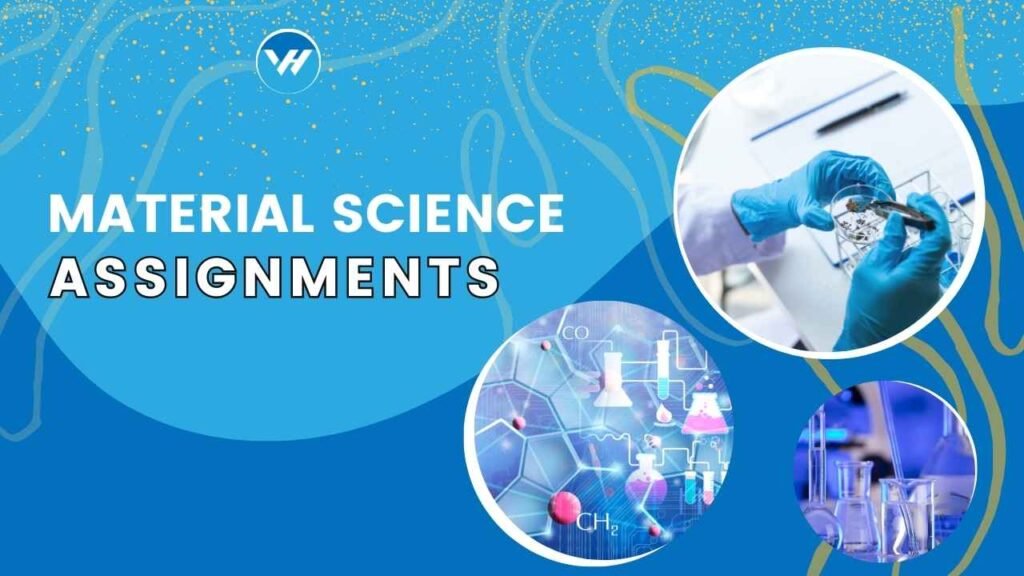Material Science is a fascinating and dynamic field that sits at the intersection of physics, chemistry, and engineering. It plays a crucial role in the development of new materials that drive technological advancement and innovation. However, students often find Material Science assignments challenging due to the complexity of the subject matter, the need for a deep understanding of theoretical concepts, and the requirement for practical application. This comprehensive guide will help you navigate these challenges and introduce you to Virtual Help, an online platform designed to provide students with the support they need to excel in their studies.

Table of Contents
ToggleUnderstanding Material Science
Material Science involves the study of the properties, structures, and applications of various materials. It encompasses a wide range of topics, from the atomic structure of materials to their mechanical, thermal, electrical, and optical properties.
Definition and Scope
Material Science is defined as the study of the properties of materials and their applications across different industries. The scope of Material Science includes the development of new materials, the improvement of existing materials, and the exploration of the relationships between the structure of materials at atomic or molecular scales and their macroscopic properties.
Key Concepts in Material Science
- Atomic Structure: Understanding the arrangement of atoms in a material is fundamental to Material Science. The atomic structure determines many of the material’s properties and behaviors.
- Phases of Matter: Materials can exist in different phases, such as solid, liquid, and gas. The phase of a material affects its properties and applications.
- Crystallography: This is the study of crystal structures and their impact on material properties. Crystallography helps in understanding how the arrangement of atoms influences the mechanical and electrical properties of materials.
- Material Properties: This includes a wide range of properties such as mechanical (strength, toughness), thermal (heat capacity, thermal expansion), electrical (conductivity, resistivity), and optical (refractive index, absorption) properties.
Types of Material Science Assignments
Material Science assignments come in various formats, each designed to assess different aspects of your understanding and skills.
Research Papers
Research papers require you to conduct an in-depth study on a specific topic within Material Science. You will need to gather information from various sources, analyze the data, and present your findings in a structured format.
Laboratory Reports
Laboratory reports document the experiments you conduct to explore the properties and behaviors of materials. These reports typically include an introduction, methodology, results, discussion, and conclusion.
Problem Sets
Problem sets are theoretical questions that test your understanding of Material Science concepts. They often involve calculations and the application of theoretical knowledge to solve specific problems.
Effective Strategies for Tackling Assignments
Successfully completing Material Science assignments requires a strategic approach. Here are some effective strategies to help you excel.
Time Management
Effective time management is crucial for handling complex assignments. Break your work into manageable chunks and set deadlines for each part. This will help you stay on track and avoid last-minute stress.
Research Techniques
Utilize academic databases, journals, and online resources to gather credible information. Make sure to take notes and organize your research materials for easy reference.
Understanding Assignment Requirements
Carefully read the assignment guidelines to ensure you meet all the criteria. If you have any questions, don’t hesitate to ask your instructor for clarification.
Collaboration and Discussion
Discussing assignments with your peers or seeking help from tutors can provide new insights and solutions. Collaborative learning can enhance your understanding of complex concepts.
Research Papers in Material Science
Research papers are a common type of assignment in Material Science. Here’s how to approach them.
Selecting a Topic
Choose a topic that interests you and has plenty of research material available. Make sure it’s specific enough to be manageable but broad enough to find ample information.
Conducting Literature Review
Survey existing research to understand what has been done in your area of interest. Identify gaps in the current knowledge that your research can address.
Structuring Your Paper
Organize your paper into a clear and logical structure, typically including an introduction, literature review, methodology, results, discussion, and conclusion.
Citing Sources Correctly
Use the appropriate citation style as specified by your instructor. Proper citations give credit to original authors and help you avoid plagiarism.
Laboratory Reports
Laboratory reports are essential for documenting and analyzing experiments. Here’s a guide to writing effective lab reports.
Importance of Lab Work
Lab work provides hands-on experience and helps you understand theoretical concepts by applying them in practical scenarios.
Structuring a Lab Report
A typical lab report includes the following sections:
- Abstract: A brief summary of the experiment and its findings.
- Introduction: Background information and the purpose of the experiment.
- Methodology: Detailed description of the experimental procedures.
- Results: Presentation of data, often in the form of tables and graphs.
- Discussion: Analysis of the results and their implications.
- Conclusion: Summary of findings and recommendations for future research.
Data Presentation and Analysis
Present your data clearly using charts and graphs. Analyze the data to draw meaningful conclusions and relate them to theoretical concepts.
Drawing Conclusions
Summarize your findings and discuss their implications. Suggest areas for further research or experimentation.
Solving Problem Sets
Problem sets require a solid understanding of Material Science concepts and the ability to apply them to solve specific problems.
Understanding the Problem Statement
Carefully read and understand the problem before attempting to solve it. Identify the key concepts and information needed to address the problem.
Applying Theoretical Knowledge
Use your knowledge of Material Science theories and principles to approach the problem. Break down the problem into smaller parts if necessary.
Showing Work and Justification
Detail your solution process step-by-step and provide justification for each step. This not only demonstrates your understanding but also makes it easier to review your work.
Checking Answers
Review your solutions to ensure accuracy. Verify your calculations and check that your answers make sense in the context of the problem.
Utilizing Online Resources
Online resources are invaluable for conducting research and completing assignments.
Academic Databases
Access academic databases like PubMed, Scopus, and IEEE Xplore for peer-reviewed research papers and articles.
Online Journals and Articles
Read articles from reputable journals like Nature Materials, Advanced Materials, and the Journal of Materials Science.
Educational Websites
Utilize educational websites like Coursera, Khan Academy, and edX for tutorials, lectures, and additional learning resources.
Leveraging Technology for Assignments
Technology can greatly enhance your ability to complete assignments effectively.
Software Tools for Data Analysis
Use software tools like MATLAB, Excel, and Origin for analyzing experimental data and creating graphs and charts.
Simulation Programs
Employ simulation software like ANSYS, COMSOL, and Abaqus to model material behavior and predict performance under different conditions.
Virtual Labs
Participate in virtual labs to conduct experiments online. This is especially useful for remote learning or when access to physical labs is limited.
Common Mistakes to Avoid
Avoiding common mistakes can significantly improve the quality of your assignments.
Procrastination
Start your assignments early to avoid last-minute stress and ensure you have enough time to complete them thoroughly.
Plagiarism
Always credit your sources to avoid academic misconduct. Use plagiarism detection tools to check your work before submission.
Ignoring Assignment Guidelines
Follow the assignment guidelines carefully to meet all the requirements. Pay attention to formatting, citation style, and submission instructions.
Overlooking Proofreading
Proofread your work to catch errors and improve clarity. Consider asking a peer or tutor to review your work for additional feedback.
Tips for Successful Assignments
Here are some tips to help you succeed in your Material Science assignments.
Staying Organized
Keep your notes, research materials, and assignment drafts well-organized. Use digital tools like Evernote or OneNote to manage your information.
Seeking Feedback
Get feedback from your peers, instructors, or tutors to improve your work. Constructive criticism can help you identify areas for improvement.
Continuous Learning
Stay curious and keep learning about new developments in Material Science. Attend seminars, read journals, and participate in online courses to broaden your knowledge.
How Virtual Help Can Enhance Your Learning
Virtual Help offers a range of services to support your academic needs and enhance your learning experience.
Finding Expert Tutors
Connect with experienced tutors who can provide personalized guidance and help you understand complex concepts.
Getting Assignment Help
Receive assistance with assignments to improve your understanding and grades. Tutors can help you with research, writing, and problem-solving.
Interactive Learning Platforms
Engage with interactive tools and resources that make learning more enjoyable and effective. Virtual Help’s platform offers a variety of educational materials and activities.
Conclusion
Mastering Material Science assignments requires a blend of theoretical knowledge, practical skills, and effective study strategies. By understanding the key concepts, utilizing available resources, and seeking help when needed, you can excel in your assignments. Remember, platforms like Virtual Help are there to support you every step of the way. Whether you need tutoring, assignment help, or interactive learning tools, Virtual Help can enhance your academic experience and help you achieve your goals.
FAQs
What is Material Science?
Material Science is the study of the properties, structures, and applications of materials. It involves understanding how the arrangement of atoms affects the material’s behavior and properties.
How can Virtual Help assist with assignments?
Virtual Help provides access to expert tutors, assignment assistance, and interactive learning tools to support students in their studies and help them improve their grades.
What are common challenges in Material Science assignments?
Common challenges include understanding complex theories, conducting thorough research, and applying concepts to practical scenarios. Time management and organization are also critical.
How do I improve my research skills?
Improve your research skills by utilizing academic databases, reading journals, and practicing critical analysis of sources. Organize your research materials and take detailed notes.
What tools are essential for Material Science studies?
Essential tools include data analysis software (MATLAB, Excel), simulation programs (ANSYS, COMSOL), and access to academic databases and journals. Additionally, utilizing online educational resources can be very beneficial.





